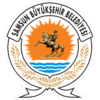Samsun | |
|---|---|
 Clockwise from top right: Samsunum-1 ship and coast, Statue of Honor, Atatürk Culture Centre, Bandırma Ferry and National Struggle Park Open Air Museum, Saathane Square, Store 55 | |
| Coordinates: 41°17′25″N 36°20′01″E / 41.29028°N 36.33361°E | |
| Country | Turkey |
| Region | Black Sea |
| Province | Samsun |
| Boroughs | |
| Government | |
| • Mayor | Halit Doğan (AK Party) |
| Area | |
| 1,055 km2 (407 sq mi) | |
| Elevation | 4 m (13 ft) |
| Population (2021) | |
| 1,356,079 | |
| • Density | 573/km2 (1,480/sq mi) |
| • Urban | 710,000 |
| GDP | |
| • Metropolitan municipality | TRY 74.830 billion US$ 8.332 billion (2021) |
| • Per capita | TRY 54,873 US$ 6,110 (2021) |
| Time zone | UTC+03:00 (TRT) |
| Postal code | 55 |
| Area code | (+90) 362 |
| Licence plate | 55 |
| Climate | Cfa |
| Website | www.samsun.bel.tr www.samsun.gov.tr |
Samsun, historically known as Sampsounta (Greek: Σαμψούντα) and Amisos (Ancient Greek: Ἀμισός), is a city on the north coast of Turkey and a major Black Sea port. Over 700,000 people live in the city.[2] The city is the capital of Samsun Province which has a population of over 1,350,000. The city is home to Ondokuz Mayıs University, several hospitals, three large shopping malls, Samsunspor football club, an opera house and a large and modern manufacturing district. A former Greek settlement,[3][4] the city is best known as the place where Mustafa Kemal Atatürk began the Turkish War of Independence in 1919.[5]

- ^ "Statistics by Theme > National Accounts > Regional Accounts". www.turkstat.gov.tr. Retrieved 11 May 2023.
- ^ "İlçe ilçe nüfus istatistikleri" [County district population statistics]. www.haberturk.com (in Turkish). 5 February 2021. Retrieved 27 January 2022.
- ^ Cite error: The named reference
Wilson, M. W p. 3was invoked but never defined (see the help page). - ^ Cite error: The named reference
:0was invoked but never defined (see the help page). - ^ Özgören, Aydın (2019). La question du Pont-Euxin. Türk Tarih Kurumu. p. 135. ISBN 978-975-16-3633-1.


